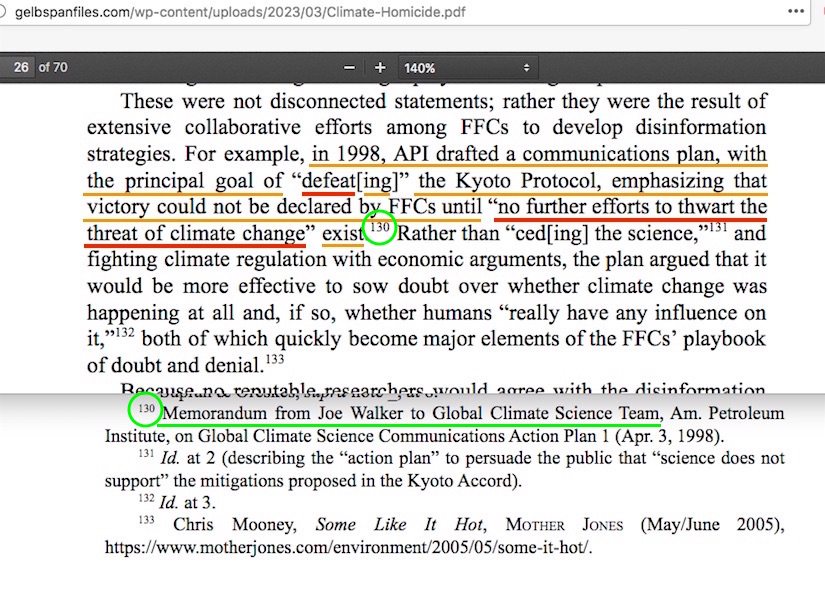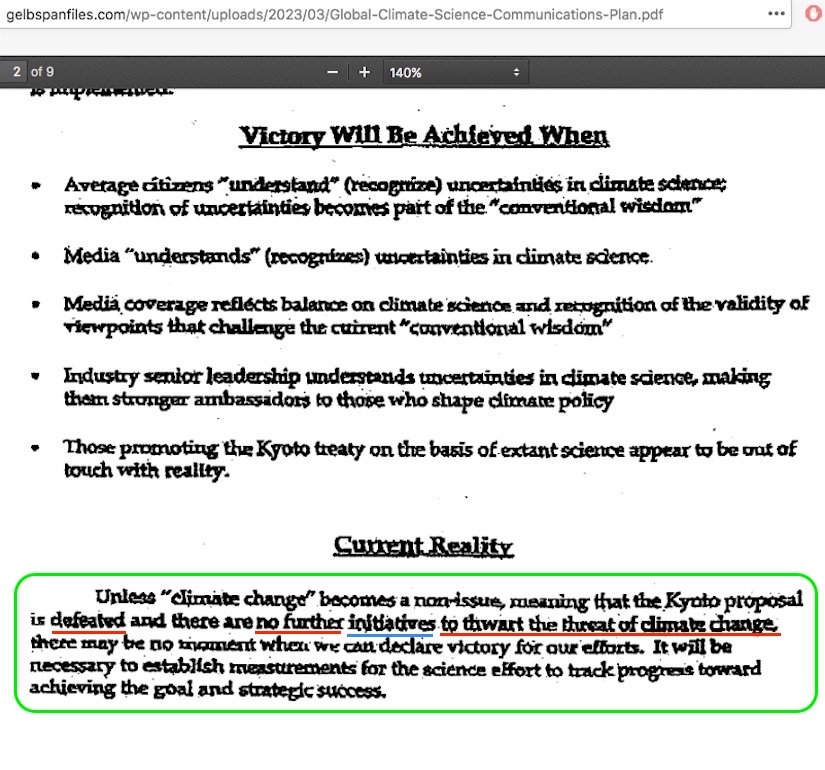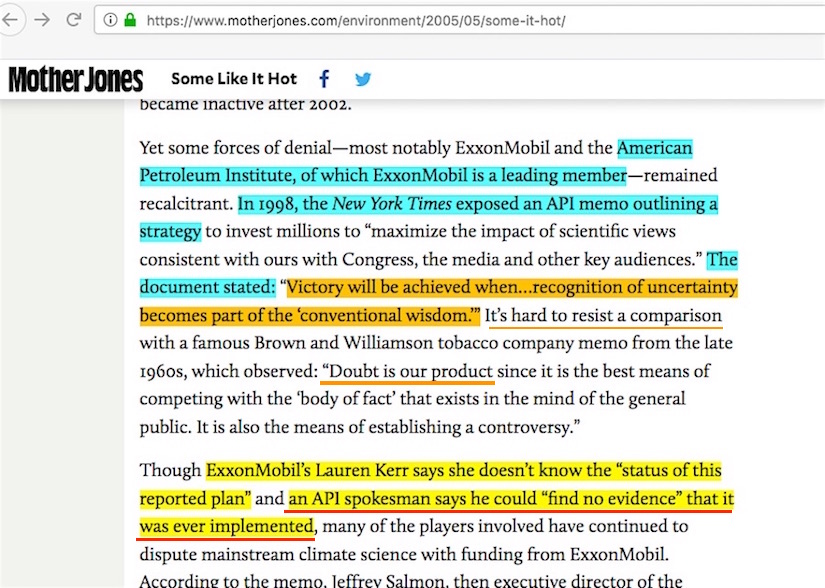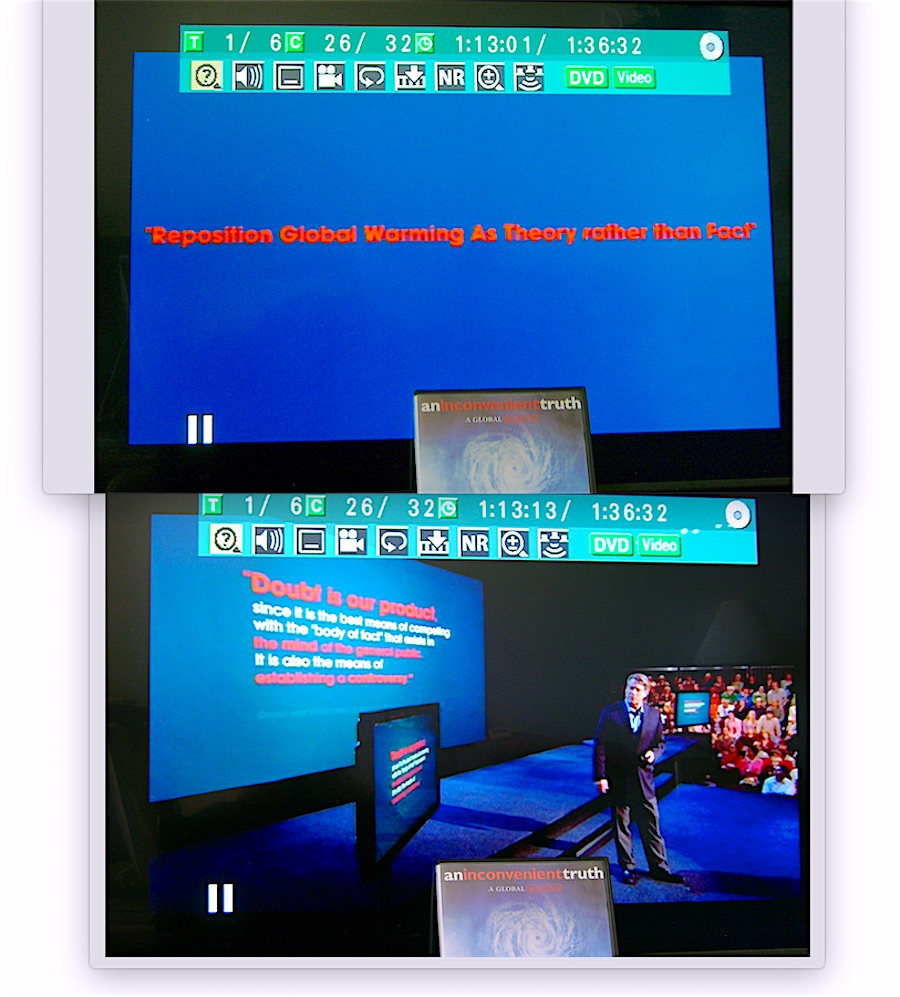The breaking ‘political climate news’ last week concerned the Harvard Environmental Law Review’s draft version of a scholarly paper (not due to be actually published until 2024) posing the idea that oil companies could be criminally charged with committing ‘climate homicide resulting from deceiving the public about the harm of burning fossil fuels.’ Particularly ludicrous to me was the statement in one of those news reports by one of the paper’s authors concerning the pitch of this idea to plaintiffs:
We have some indication they’re at least listening and curious,” said David Arkush, director of Public Citizen’s climate program and a fellow at the Roosevelt Institute. “To someone who knows the criminal law, there’s a moment of ‘What!?’ and then, ‘It’s OK. It’s not crazy.’
Not only is this notion crazy, it would be an act of political suicide.
Because they’d have to justify such a drastic action with verifiable facts.
Let me explain why — whenever I see some prominent accuser hurl the “Big Oil disinformation / crooked skeptic scientists” accusation, I do key word / name searches within the accusation to see if the ‘usual suspects’ pop up. In this paper, they did, and the more I look at it, the more it resembles the assembly of material seen within nearly all of the current ExxonKnew-style lawsuits which seem to follow a preformatted template, citing supposedly damaging ‘evidence’ from dubious sources. Rather than bolster the overall case that ‘Big Oil & Coal’ conspired in disinformation campaigns to deceive the public about the certainty of catastrophic global warming, this paper is just another log thrown into the fire of an apparent conspiracy promulgated by a core clique of enviro-activists to deceive the public into believing the industry ran disinformation campaigns.
If there’s anyone begging to be prosecuted, or at least minimally held accountable for epic-level defamation of skeptic climate scientists, it’s that core clique of enviro-activists. Part of an investigation should concern why people such as the two authors of this paper are literally unable to come up with any ‘evidence’ outside of what the public has already seen from those enviro-activists after two+ decades of this worn-out ‘industry disinformation campaigns’ accusation.
At some future time, I should create a new post for my “Background” series with a key word / name search checklist of what to look for in these kinds of prominent accusations. Today, the bulletpoint list below will have to do, with the blog post links for the first two items and tag category links for the people listed where they are significantly featured in the posts within each category. I do have more. Plenty more. Like I say at my LinkedIn account page, though, “If you’re associated with one of the defendant law firms in the two dozen+ “Exxon Knew”-style global warming lawsuits, or are a congressional staffer, or are a traditional, objective, unbiased news reporter, you’re in the right place.”
• Key words: “reposition global warming as theory” — out of the rejected worthless memo set proposed to the Western Fuels Association’s “Information Council for the Environment” public relations campaign in 1991. This literally the ‘most viable-sounding’ bit of evidence in enviro-activists’ accusation arsenal.
• 1998 American Petroleum Institute (API) “Victory will be achieved when average citizens understand uncertainties in climate science” memos. This worthless, never-implemented set, surrounded by problematic narratives about its origins and who favored it before they didn’t, is literally the second-best bit of evidence in enviro-activists’ accusation arsenal.
• Key names: Ross Gelbspan, who’s second career is built on the “reposition global warming” memos as the result of his 1997 “The Heat is On” book.
• Kert Davies, whose career is built on both memo sets, currently heads the Climate Investigations Center with its climatefiles.com platform. My tag category of him is many pages long.
• Naomi Oreskes, who’s second career is built on the “reposition global warming” memos she initially detailed in her 2007-’08 PowerPoint presentation. Three tag categories, one for her faulty narratives, another for her inconsistent ‘discovery odyssey tales’ and a third ‘other significant appearances’ one.
• Geoffrey Supran, a subordinate of Oreskes. • Ben Franta • Chris Mooney • Amy Westervelt • Carroll Muffett
Now, in regard to this “Climate Homicide” paper, in an E&E News interview about it, one of the paper’s authors said,
We concluded there aren’t really any legal or factual barriers to prosecution.
Despite the paper’s declarations that the collective fossil fuel industry was fully aware in the 1960s /’70s of “climate change” – to a warmer climate, not a cooler one, the industry could not have known with any certainty that the burning of their products caused the warming in the face of all the then-current concern about impending global cooling – cooling!
Then there’s the fact that PhD-level climatologists / atmospheric physicists, and experts in statistical data gathering and analysis can provide uncounted hours of science-based evidence that, despite the paper’s conclusion about “the extent of scientific consensus about the role of fossil fuels in altering the climate,” the “show of hands” opinion on catastrophic man-caused global warming is a completely untenable assertion.
But let’s set that aside and examine the facts of the paper’s political accusations:
Despite referring to disinformation campaigns eight times, the paper never mentions the far more viable-sounding “reposition global warming” memos as evidence … but an illustrative situation about those memos arises from the authors thanking Michael B. Gerrard on page 1. In a 2007 book Gerrard edited, he missed how one of the chapter contributing authors attributed the “reposition global warming” memos to the American Petroleum Institute – an error the chapter author and Gerrard didn’t fact-check which came out of the subsequently dismissed Comer v Murphy Oil lawsuit — an error that traces back to a Seattle Times reporter who incorrectly said Ross Gelbspan was the first to uncover the memos. ‘Oil interests’ and the “reposition global warming” phrase is as close as the article ever gets to what is said in the Comer v. Murphy lawsuit filing, the article never directly mentions the API.
Facts matter. When folks like authors and editors and reporters don’t do their due diligence about authoritative assertions, this can only go rapidly downhill from there.
It sure does in this “Climate Homicide” paper. The one-and-only example the paper’s authors offer of disinformation campaign efforts is the American Petroleum Institute “victory” memos.
But without even referencing its most infamous phrase.

… in 1998, API drafted a communications plan, with the principal goal of “defeat[ing]” the Kyoto Protocol, emphasizing that victory could not be declared by FFCs until victory could not be declared by FFCs until “no further efforts to thwart the threat of climate change” exist …
Have no fear, the most infamous phrase is right above that “thwart the threat” bit.

(the Greenpeace Investigations website with these scans went offline in late spring 2022, but you can still download your own copy of their horribly degraded photocopy scans from the Internet Archive version here or look at my copy online. Need a word-searchable version? It’s here, after the “Memo Follows” headline.)
Interesting, isn’t it, that this paper’s footnote citation for their “thwart the threat” bit only goes to a reference to “Memorandum from Joe Walker” without providing either Kert Davies’ page link for his new or old scans copy, or to Inside Climate News’ copy? Interesting, isn’t it, that when viewed in its full context that the above red-highlighted direct-quote words end up being much more of a simple truism?
Unless “climate change” becomes a non-issue, meaning that the Kyoto proposal is defeated and there are no further initiatives to thwart the threat of climate change, there may be no moment when we can declare victory for our efforts. It will be necessary to establish measurements for the science effort to track progress toward achieving the goal and strategic success.
The authors of this paper dig their hole here one huge increment deeper when they follow their out-of-context truncated quote with a claim that,
Rather than “ced[ing] the science,” and fighting climate regulation with economic arguments, the plan argued that it would be more effective to sow doubt over whether climate change was happening at all …
Uh, no, the full context paragraph does not say that at all.
The advocates of global warming have been successful on the basis of skillfully misrepresenting the science and the extent of agreement on the science, while industry and its partners ceded the science and fought on the economic issues. Yet if we can show that science does not support the Kyoto treaty – which most true climate scientists believe to be the case – this puts the United States in a stronger moral position and frees its negotiators from the need to make concessions as a defense against perceived selfish economic concerns.
They dig their problem even deeper in the continuation of their bit above with another six utterly out-of-context quoted words:
…it would be more effective to sow doubt over whether climate change was happening at all, and, if so, “whether humans “really have any influence on it, …
Uh, no …
The climate change theory being advanced by the treaty supporters is based primarily on forecasting models with a very high degree of uncertainty. In fact, its not known for sure whether (a) climate change actually is occurring, or (b) if it is, whether humans really have any influence on it.
The entire 9 page collection of lousy scans does not actually contain anything remotely similar to a directive, suggestion, or subtle hint that anybody needs to “sow doubt”, “manufacture doubt,” “prompt doubt.” The simple fact is that the only time the word “doubt” occurs is in reference how many people responded to a particular survey.
Making this worse, the paper’s authors pile on by saying that in regard to the “victory” memos’s two truncated bits of sentence they quote,
… both of which quickly become major elements of the FFCs’ playbook of doubt and denial.
And their citation source to back this up is Chris Mooney’s 2005 “Some Like it Hot” 2005 Mother Jones article. He only used the word “doubt” twice, first to mention the “reasonable science doubt of 1990, and then again right after he clearly compares the “victory” memo to a tobacco industry memo, and then adds that there was no evidence the “victory” memo was ever implemented in any form.

API Executive VP / COO William O’Keefe told Newsweek magazine directly that the “victory” memos’ plan was never implemented. I have that on firsthand corroboration from him that the plan was never implemented. Truth is, the Kyoto Treaty which the API plan was musing about defeating was actually already dead on arrival in the United States, even prominent enviro-activists knew the U.S. Senate would never ratify it.
Who else compared a never-implemented fossil fuel industry memo to a tobacco industry memo? Oh, right. Al Gore.

Any given rejected, unsolicited or never implemented proposal or plan, by default, cannot serve as evidence that particular actions took place.
But I digress there. Except not quite. Remember the list of bulletpoint names above? Dig into the links I have for them and you soon see every one of them is separated by three degrees or less from Ross Gelbspan’s beloved “reposition global warming” memos accusation, where all would likely not hesitate in the least to call those memos “smoking gun” evidence of industry-led disinformation campaigns.
Who’re the sources of ‘damaging material’ cited in this “Climate Homicide” paper? Kert Davies’ climatefiles 5 times; Naomi Oreskes 6 times; Geoffrey Supran 4 times; Ben Franta 4 times; Chris Mooney twice; Amy Westervelt twice; Carroll Muffett once. There are other name problems, but I’ll stop here.
But there’s always more. Regarding that last name, Muffett, notice right below his citation is the next footnote about the “James Black Report.” This paper cites Kert Davies’ Climate Files site for several different industry documents, but regarding the “James Black Presentation to Exxon,” they cite Inside Climate News. Who else did that same thing …. for the identical James Black documents? The Sher Edling law firm, as I noted in my dissection of their Charleston v Brabham Oil filing. Naomi Oreskes is on retainer with Sher Edling.
That’s what I meant by the “assembly of material within ExxonKnew-style lawsuits seemingly following a preformatted template citing highly dubious sources.” This appearance is not helped in the least by the back-to-back appearances of Inside Climate News and Kert Davies in last April’s PBS Frontline report about ‘Big Oil running disinformation campaigns.’
Think the problems end there for the paper’s authors? Think again.
No later than the 5th sentence on page 1, the authors essentially say the fossil fuel companies poured money into efforts intended to – bottom line – protect their vast income.
Flip the idea 180°. Whose income stands to disappear if the idea of man-caused catastrophic global warming is proven to be entirely overblown.
The hint is seen in the label for one of the paper’s authors, David Arkush, footnote #1 on that first page: “Director, Public Citizen’s Climate Program.”
Who’s one of the funders of Public Citizen? The Rockefeller Family Fund. Who’s the Director of the Rockefeller Family Fund? Lee Wasserman. Who’s name was seen at the top of a 2016 leaked email that detailed a plan to portray Exxon as corrupt in the eyes of the public? Wasserman, along with Kert Davies, Carroll Muffett, and Davies’ boss John Passacantando at both Greenpeace and the old forgotten Ozone Action environmental group. Ozone Action being the group which was the first to prompt lasting, ongoing media traction for the “reposition global warming” memos, worthless as they were even when mentioned in generic form. Who is Passacantando married to? Rockefeller Family Fund Assistant Director Lisa Guide. Who, after leaving Greenpeace and starting up a mystery LLC business has earned nearly $16 million in dark money? John Passacantando, where portions of that money is reported to be funneled to Kert Davies’ efforts to push the idea that the fossil fuel industry ran disinformation campaigns. Who provided funding to Geoffrey Supran and Naomi Oreskes’ paper castigating Exxon for running disinformation campaigns? The Rockefeller Family Fund.
This so-new-that-it-isn’t-even-officially-published-yet “Climate Homicide” draft paper doesn’t do a solitary thing to resolve any of the problems seen in any prior “Big Oil disinformation / crooked skeptic scientists” accusations, it only begs for more questions on who prompts these kinds of ham-handed efforts, who provides the worthless evidence citations, and who pays for these efforts.
————————————————————————
There’s always more – Part 2: I don’t just write about these situations, I try to do something about them.
